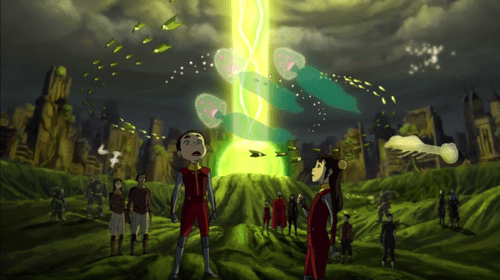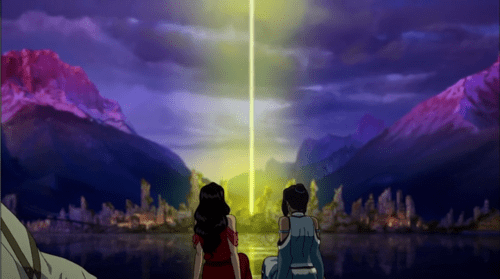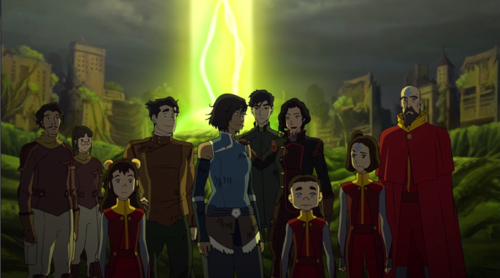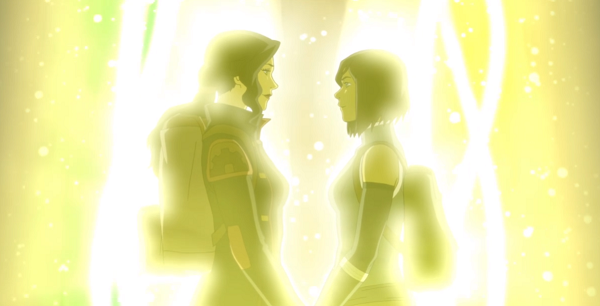The following was originally posted on Dee Hogan’s blog The Josei Next Door and has been republished with permission.
I watched this episode twice—once when it premiered and again the next morning—because I spent most of the first time gnawing my fingernails down to the bone, and I didn’t want to write about the episode without having a chance to see it again, anxiety-free. The nerves were partly due to just plain old emotional attachment (characters were throwing up death flags left and right), but also due to the fact that endings are really, really difficult, and I’ve seen too many great series trip all over themselves in the final minutes. So there I sat, desperately wanting LoK to end well and seriously concerned that it wouldn’t.
So let me start by saying how elated I was when the end credits rolled, because Bryke & Co. have done it again and crafted a splendid finale, writing a lovely final page to a series that only seemed to get better with time. Much like with A:tLA, it’s not quite what’s expected—the protagonist’s real conflict proves to be more internal than external, the resolution reached due to an understanding of the Avatar’s own values rather than a big, violent showdown (although we certainly had that, too)—but it’s very much the ending the series needed, bringing together many of the show’s central themes as well as providing a kind of completion (of one stage, at least) to Korra’s growth and journey as a person. It may not have gone where I thought it would go, but it ended up exactly where it needed to be.
There’s so much we could talk about, but I really just want to focus on Korra, her relationships with two other prominent women this season, and how it ties in with ideas that have been running through the entire series.
Korra and Kuvira

I spent a lot of this season worrying about this finale, and particularly about how they’d handle Kuvira’s character. It started to feel like Bryke were writing themselves into a corner: on the one hand, this season was all about redemption and learning from the past; on the other, Kuvira’s actions were quickly moving her out of “redemptive” territory (I even said previously that betraying Batar put her solidly in the bad guy camp). How would they reconcile those season-long themes of redemption with their increasingly irredeemable antagonist?
In two ways, it turns out. First, by portraying Kuvira as a flawed human being, a proud, strong woman with initially good intentions who—due to her own weaknesses and her isolated position—eventually became consumed by her ideology, performing increasingly monstrous acts for the sake of a once-noble goal (“She’s a complicated person,” as Su puts it). The motivation behind her actions are understandable and we can even sympathize, but (and this is important) she’s never painted as a victim, and the series never tries to gloss over or pardon her for her crimes. It’s a delicate balance the show strikes here, but it works.
The second way LoK reconciles its themes with its characters is a bit trickier, but also kind of brilliant, because the season’s central “redemption” arc isn’t about Kuvira at all; it’s about Korra, and the journey she’s taken from the first moment we met her back in Book One. While Korra’s personal growth of course runs through every LoK season, by bringing us back to Republic City and back to these central issues of power and control, the show really is book-ending (no pun intended) these final episodes with the first ones and asking us to compare them.
And man, what a comparison. Remember that girl who responded to the Equalists’ protests by brushing them aside and proudly announcing that being a Bender was the Best Thing Ever? Compare her to the young woman at the end of this episode, willing to risk her life to save a dangerous dictator, “seeing herself” in Kuvira and sympathizing with her because of it. The Korra of Book One could never empathize with those who struggled to find power and control because she’d had power from the day she was born—physically, psychologically, and socially, Korra was a privileged person who had a great deal of control and believed she had even more than that. It was only after having that power challenged and taken away—physically, psychologically, and socially—and multiple times, in fact—that Korra finally came to understand not just her enemies, but the marginalized groups her enemies had initially sought to protect and empower.
Korra and Her World

I hadn’t realized it until those final moments between Korra and Kuvira, but really, LoK has always been an exploration of marginalization, and the impact it can have on both the individual and cultural level. From the non-benders in Book One to the spirits in Book Two to the Ba Sing Se low-income classes in Book Three, and finally to the Earth civilians who supported Kuvira, each season focused on a group excluded from society, sometimes even physically separated from the rest of the world (as was the case in Books 2-3), and how that exclusion led to bitterness, anger, and eventually exploded into violence.
Our antagonists, then (with the semi-exclusion of Unalaq, who was… not a well-written character), served as leaders behind whom the marginalized group could rally. They had the desire and—more importantly—the power to enact change, and they fought for it. But, as Toph noted, they all took their ideologies too far, and instead of working to create a power balance (there’s that word “Balance” again), they instead sought to subjugate another group (benders, human society, world leaders, the other nations), making them no better than the people they fought.
As with Kuvira, LoK walked a tricky tightrope here. Push too hard in one direction and you make it seem as if your antagonist’s extreme methods are acceptable; push too hard in the other and you run the risk of denying the validity of their initial cause, of arguing for oppression instead of against it. While the series rarely discussed these issues in explicit terms, and while Korra’s early opinions didn’t always gel with the message of the show itself, LoK still (usually) managed to strike this balance quite well. Every season I sympathized with the antagonist’s cause to some extent, and every season I also understood why that antagonist needed to be stopped.
More importantly, though, Korra herself (and the people of the Avatarverse as a whole) slowly came to understand this as well. Republic City did away with its council and held an open election, giving benders and non-benders alike an equal voice (and putting a non-bender in charge to boot). Korra decided to leave the Spirit Portals open, allowing the spirits to travel freely again. Ba Sing Se’s walls stay down and the Earth Nation—thanks to Former Prince Wu (just one more great example of a dynamic character arc)—finally abolishes the monarchy, giving the people and individual states both the freedom Zaheer sought and the safety Kuvira desired.
We see these ideas about equality, control, and the importance of empathy (particularly from those who do have power) on the micro level throughout the series, and especially in this final season: Asami, Varrick, and Zhu Li all fight to make sure their technology isn’t abused; Zhu Li steps out from her subordinate position and into a partnership; Tenzin’s kids are given new responsibilities and struggle to use that power effectively; Prince Wu learns how to lead (and when to step aside); and of course both Kuvira and Korra struggle with issues of control, Kuvira from a sudden position of immense power and Korra from a sudden position where she lacks almost any power at all.
Everyone reacts and is affected by these changes differently, but in the end it’s the ones who show compassion and wield their power responsibly who win the day. The world is a more balanced place at the end of LoK than it was at the start, not because Korra defeated “the bad guys,” but because she learned from them, and became a wiser, kinder person for it.
Korra and Asami

No doubt there will be debates and disagreements on both sides of the aisle for some time to come—on the supposed ambiguity of the ending, on the nature of the Korra/Asami relationship, on if the show “went too far” or “not far enough”—and those who participate in “shipping wars” will be having a grand old time, I’m sure.
As someone who never had a horse in this race, I think I can address it from a somewhat objective perspective, which is this: in the context of the story, the lighting choices, the music, and the focus of the animation frames, there is absolutely nothing ambiguous about it. Korra and Asami are going to pursue a romantic relationship, and I am so, so proud of Bryke & Co. for going that route.
It works from a character perspective, sure—these two have always gotten along really well and there’s been some chemistry there for the past two seasons—but it’s also just about perfect in the broader sense: in a show that’s spent so much time on marginalized groups, what better way to put a cherry on top of the thematic sundae than by having your main character be a part of a real-world marginalized group? (I say “real world” because there’s absolutely no indication that LGBTQ persons are marginalized with the Avatarverse itself, and in fact the way Korra and Asami approach their relationship with such relaxed, natural ease strongly suggests that there is no social stigma here the same way there is in American society.)
The ending is inspiring and gratifying for those of us who crave this kind of representation in our fiction; but it’s also a challenge, I think, directed not just at the networks producing “children’s” programming who refuse to allow openly queer characters, but also to the audience members themselves, particularly the young adults at whom the show is technically aimed.
After all, we’ve just watched four seasons about groups who’ve been denied their voices and representation. We’ve seen in varied detail the frustration and hurt that such an environment creates, and we’ve come to understand (along with Korra) that we can and should support these marginalized groups, responding not with violence but with compassion and understanding to help create a more balanced world.
And so, after all of that, Bryke & Co. present us with a happy couple who would be marginalized in our own world… and promptly close the curtain. It’s a lovely, clever way of passing the torch out of the Avatarverse and into our own (the fact that Korra and Asami vanish into another world themselves is indicative of that in a delightfully meta way), and asking us what we’ll do with it. Have we learned along with Korra, or are we still the privileged, short-sighted kid who came riding into town on the polar bear dog, all those episodes ago?
Something to consider as the end credits roll.
A Legend Worth the Telling

So in the end, we have a series about a powerful, bisexual woman of color battling against violent zealotry while simultaneously coming to understand the experiences and feelings that give rise to such extremism—the frustration that comes from a lack of control, the anger that develops when one’s voice has been ignored (or outright silenced) for too long—which, in turn, leads her to eventually empathize with and in many ways fight for her antagonists’ goals, even while she (and the series) condemns their methods. It’s a story about growing up, to be sure—about moving outside your own sphere and becoming the kind of adult who can see the world from other perspectives—but more than that, it’s a story about the effects of marginalization, the dangers of privilege, and why it’s so important to see opposing perspectives not as an “us vs. them,” but as a chance to understand, to learn from, and to ultimately help one another.
The Legend of Korra is a great story, but it isn’t just a great story. It’s also an important one, ambitious and progressive, and proof of the kind of artistic heights American YA animated series can attain, if we’d only give them the chance. It’s more than earned its place right beside A:tLA (and in many ways surpasses it), and I hope the series continues to garner fans and accolades for years to come. It certainly deserves every ounce of praise it receives.
So, to conclude, I want to take off my Objective Reviewer Hat and just say thank you to Bryke and their amazing crew for crafting these characters and this story, for believing and respecting their viewership enough to give us something so smart and sophisticated, for pouring so much thoughtfulness and passion into every aspect of the series, from the complex story to the gorgeous music and animation. Thank you for giving us Korra and Aang, Katara and Asami, Toph and Mako and Bolin, Sokka and Suki and Varrick and Zhu Li, Zuko and Iroh and Tenzin and Lin and all the kids and grandkids in the Team Avatar family. Thank you for “My cabbages!” and “Do the thing!” Thank you for believing that complicated stories can still be positive ones, that abused kids can become wise rulers and selfish teens can become compassionate adults. That trauma can change us without controlling us, that the love of a family member, a friend, a teacher, or a romantic partner can help us through our darkest times, and that we can all find the strength to grow into better people.
Thank you, so much, for creating the Avatarverse. And while I’m sad to see its animated world coming to an end, know that I’ll be gobbling up the comics for as long as you want to make them, and that I can’t wait to see what kind of legend you tell us next. Whatever it is, this is one viewer will be back without hesitation.
Onwards to the next adventure.

Dee (@JoseiNextDoor) is a writer, a translator, a book worm, and a basketball fan. She has bachelor’s degrees in English and East Asian studies and a master’s degree in Creative Writing. To pay the bills, she works as a technical writer. To not pay the bills, she writes young adult novels, watches far too much anime, and cheers very loudly for the Kansas Jayhawks. You can find her at The Josei Next Door, a friendly neighborhood anime blog for long-time fans and newbies alike.
Are you following The Mary Sue on Twitter, Facebook, Tumblr, Pinterest, & Google +?









Published: Dec 27, 2014 11:00 am